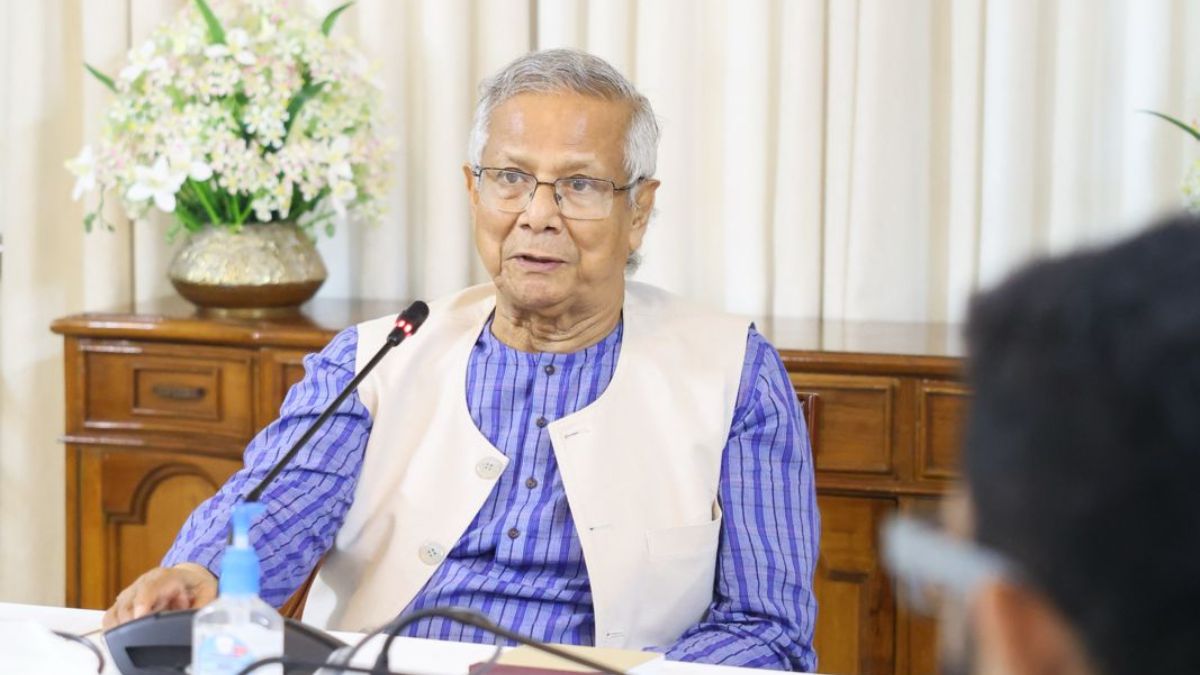Protests have broken out after the Muhammad Yunus government cancelled advertising for PT and music teachers at Bangladesh universities after threats from Islamist groups, who want religious teachers to be hired.
The Yunus regime has been accused of kowtowing to religious extremists since it came to power after the fall of the Sheikh Hasina government in August 2024.
But what happened? What is the Yunus government saying?
Let’s take a closer look:
What happened?
The Government Primary School Teacher Recruitment Rules 2025 gazette, issued on August 28, advertised the posts for music and physical education teachers. However, a revised circular issued on Sunday, signed by the Secretary of the Ministry of Primary and Mass Education, left both positions out.
This came after a threat from Islamist groups, which called such jobs ‘un-Islamic’ and threatened to take to the streets if the Bangladesh interim government went ahead with the appointments.
The Islamist groups, including Hefazat-e-Islam and Islami Andolon Bangladesh, demanded that the government hire religious teachers instead of PT and music teachers.
On Thursday, students and teachers from the University of Dhaka, Jagannath University (JnU), Chittagong University (CU), and Rajshahi University (RU) responded to the development by holding protests in Dhaka.
The students and faculty from the music, drama, and dance departments of the University of Dhaka gathered at the famed Oporajeyo Bangla sculpture around 11:30 am on Thursday morning. The protest began with the Bangladesh national anthem being sung.
Meanwhile, at Jagannath University, students gathered at Sculpture Square and held hands to make a human chain across the campus. They were supported in their endeavour by singer Shayan. The Literature and Culture Secretary of Dhaka Central Students’ Union and culture secretaries from various other unions were also present.
Nusrat Chowdhury Zafrin, a student of the 2019–20 batch of the Department of Music, said, “We want melodies to resonate in every educational institution. Today’s protest is not for any personal gain.”
Music department teacher Azizur Rahman Tuhin told Daily Star that art is the foundation of civilisation and that refusing to teach students subjects like music would only hurt their development. “If I want my child to grow up as a proper human being in the future, can I raise them to be a worthy person without music education, cultural education, and physical exercise?”
Israfil Shahin, a teacher from the Theatre and Performance Studies department, added, “When an order has been given, who cancels it? A state cannot flourish through religion alone. Culture never opposes religion.”
Singer Shayan said, “There’s a group trying to pit music and religion against each other. Instead of falling into this trap, respond with songs at every opportunity.”
Jagannath University Chhatra Front General Secretary Shamsul Alam Maruf called the move “cultural fascism.”Hema Chakma of Dhaka University claimed the student union representatives had called the national anthem a “pagan” song. “I reject with disgust the interim government’s efforts to eliminate these subjects,” Chakma added.
At RU University, music department students held a protest in front of the university’s Senate Building around 11:30 am. They were joined by teachers and students from the Departments of History, Philosophy, and Islamic History and Culture. The students and teachers then unveiled a list of demands and concluded the protest by performing songs.
On CU campus, students of the Music and Physical Education departments held a protest around 11:00 am at the university’s Shaheed Minar. This protest too concluded with songs by students.
Humayra Uponyas, Culture Secretary of Bangamata Sheikh Fazilatunnesa Hall, told the Dhaka Tribune that music is far more than just entertainment. “The regrettable thing is that those at the policy-making level don’t understand the importance of music," she said.
What is the Yunus government saying?
On Monday, Bangladesh’s Ministry of Primary and Mass Education said the offer for the posts had been rescinded.
“Although the rules issued last August had four categories of posts, two categories have been included in the amendment. The posts of assistant teachers for music and physical education are not in the new rules,” ministry official Masud Akhtar Khan said.
Asked whether this was due to pressure from Islamist groups, he said, “You can check for yourself.”
The Chief Adviser’s Office on Monday said that the proposal to appoint music and PT teachers was withdrawn after a recommendation of the Secretaries’ Committee, which discovered flaws in the development and feasibility of the programme.
The office claimed that appointing so few teachers would not ‘effectively benefit’ primary education and would in fact create inequality across the country’s nearly 66,000 primary schools. It said a single teacher would have to work in more than 20 schools, which would make such a job unfeasible. The government claimed that new positions in schools would be carefully considered when the requisite funds would be available.
However, critics say that the Yunus government is going soft on Islamist groups, which have gained prominence and increasing power since the fall of the Hasina regime. They claim that the Yunus government is relying on such groups to help it retain its hold on power. These groups recently demanded a ban on the International Society for Krishna Consciousness (ISKCON), claiming it is an “extremist organisation.”
With input from agencies
)